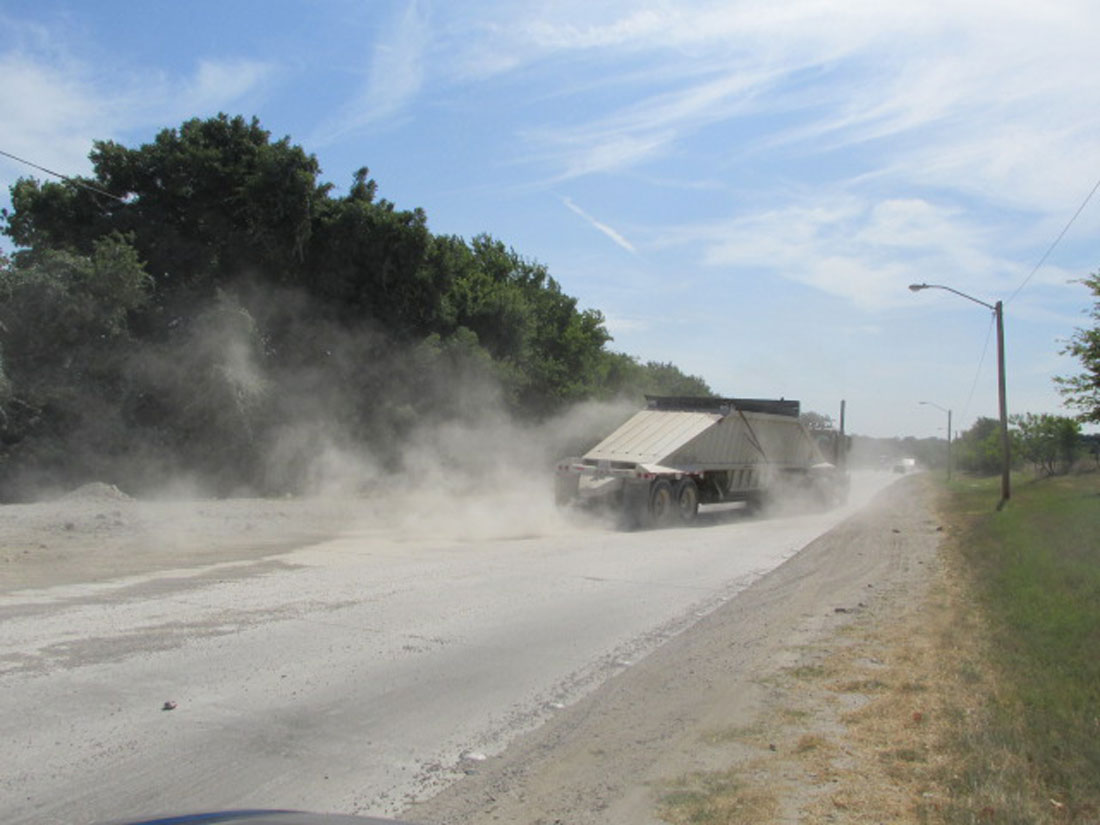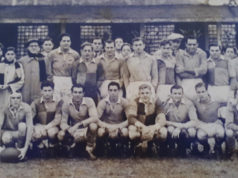The diesel truck traffic along Oakland Boulevard and Old Randol Mill Road on Fort Worth’s East Side increased dramatically after Chesapeake Energy Corp. established its massive gas-drilling compressor station about five years ago. Many residents were angry to see the compressor station built on the site of Arc Park, where teams had competed on six softball fields for 25 years. In other words, Chesapeake isn’t on the neighborhood’s Christmas gift list, and the company is still the target of much criticism.
The number of trucks has grown to a mind-boggling number in recent months, with a steady stream of dirt-haulers coming and going on East First Street, stirring up dust, slinging mud, creating traffic jams, and tearing up the road.
Mike Phipps chairs the code compliance committee for the West Meadowbrook Neighborhood Association, and he and others began staking out First Street.
“Everyone thought it was Chesapeake,” Phipps said. “It [the traffic] was just getting looked at as the gas industry.”
As it turns out, the trucks were making their way to and from a property adjacent to the compressor station. The entranceway is marked “JD’s Trucking.” A sign indicated the landowner had been issued a permit to haul fill dirt to the property, which sits in the Trinity River floodplain.
Phipps and others, however, noticed that most of the trucks seemed to be hauling dirt away. They followed some of the trucks and noticed they were taking their loads to residential developments under construction.
“What they are doing is mining,” Phipps said. “They are hauling truck after truck. It’s extreme. It’s unbelievable.”
The entrance to the truck company property isn’t paved, and the trucks created huge balls of dust as they came and went. When it rained, the trucks slung mud. The company had placed large–gauge gravel on the driveway to improve traction, and some of those rocks ended up in the street, creating a hazard for passing cars.
The neighborhood association complained to the city last week, and a city inspector went on a stakeout. It wasn’t the first time. An inspector had investigated a complaint about trucks in September 2012, but it was determined that the property owner was in-filling the levee along the Trinity for the U.S. Army Corps of Engineers and didn’t need a city permit.
In October the city discovered the property owner had created a rock-crushing operation that violated its permit.
“They stopped that operation and returned to what appeared to be the legitimate operation of the floodplain permit: to change the elevation on part of that site,” said Planning and Development assistant director David Hall. “That’s what they’re supposed to be doing.”
Last week, however, a city inspector staked out the property again and followed a truck loaded with dirt to see where it was going.
“I followed one of these vehicles to a new home site in Westover Hills where they need a considerable amount of fill dirt to level the home site,” the inspector wrote in a report. “The driver backed in and dumped at this location.”
The truck was hauling fill dirt to “a residential subdivision in another city,” Hall said.
The city issued a stop work order on Friday. This week, the JD’s Trucking front gate was shut and locked with no truck traffic coming or going.
“It appears the operations are not within the confines of their permit,” Hall said. “Right now we’re in a fact-finding stage. We’re going to give them the opportunity to explain the nature of their activity. They do have permits that in theory could somehow allow for that activity. If they can’t establish that, they’ll be shut down.”
The permit allows the property owner to move dirt around on the property and to bring in fill dirt from an outside source. It doesn’t, however, allow the property owner to mine for soil and transport it off the property for commercial sales.
Fort Worth Weekly called JD’s Trucking and asked to speak with the owner. A man who identified himself only as “JD” spoke with a reporter briefly.
“I don’t understand what the problem is,” he said. “There are no neighbors within a mile.”
I explained that residents didn’t like trucks cutting through neighborhoods and creating traffic problems, particularly if the operation wasn’t properly permitted. I asked him if he had proper permits for hauling dirt off the property for commercial purposes.
“That’s the legal side of things; I don’t deal with the legal side,” he said.
He owns the business, he said, and suggested calling the property owner, Mike McGuffin.
That name rang a bell.
McGuffin is the same property owner who clashed with residents when he began a sand-mining operation a few miles away, adjacent to houses in the Mallard Cove neighborhood (“Dust-Up,” July 28, 2011). In that situation, McGuffin turned his 42-acre cow pasture into a sand mining operation that increased dust, noise, and truck traffic. After removing and selling the sand, he was going to replace it with topsoil and grow hay, he said. He trucked in huge amounts of topsoil and pushed a massive, towering mound of it up against the fences of a dozen Mallard Cove homeowners.
The neighbors complained vehemently to the city. McGuffin said he was within his rights to mine for sand on his pasture, which was zoned for agriculture uses. “Ag” zoning is a relatively lax classification that allows property owners to move dirt. McGuffin’s crew dug as far as 20 feet down to remove sand and haul it away.
Neighbors, however, noted that ag zoning doesn’t allow for a mining operation that includes hauling large amounts of fill dirt from an outside source without a permit. That technicality allowed city officials to temporarily stop the work.
McGuffin criticized the neighbors for complaining to the city without talking to him first.
“The neighborly thing would have been for them to come to me, and I would have told them that after three months this would be completed,” he said at the time.
The city met with McGuffin and established a timeline for him to finish the sand mining and remove the large mound of dirt. Now McGuffin has another neighborhood cursing him for establishing an industrial activity too close to houses. His zoning on the East First Street property is classified as a mix of multi-family and commercial that does not allow for selling and hauling soil without a permit.
McGuffin did not return phone calls for this story.












